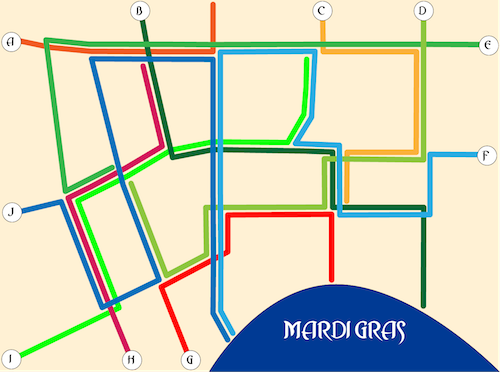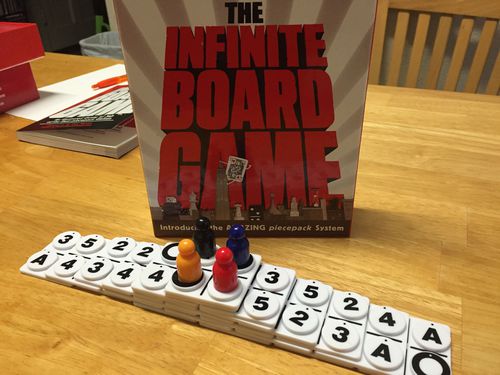I spent my June journeying back to board game design, both physically and mentally. In graduate school, designing board games became my major hobby, and I made many excellent friends through attending Protospiel each year in Michigan. After graduation, perfecting my teaching craft consumed me, meaning much less time for game design. I’m happy to be able to set aside some time during my sabbatical to polish up some old designs and work on new ones.
First, I cleaned up the Goadrich Games website where I host links to my board and card games and video games made for game jams. It is still a rather vanilla Bootstrap layout, but I’m happy to have all the links in one place. I’ll be adding more images and links here as I spin out more games throughout my sabbatical.
Second, I was able to travel back to Michigan in June to playtest with many of my friends, who have gone on to publish and produce games such as Wits and Wagers, 1812: The Invasion of Canada, Rome: City of Marble, Hawaii, and Pants on Fire. We spent the weekend playing and deconstructing each other’s designs, cooking excellent meals, and eating ice cream. What impresses me the most about this group is the combination of elegant design skills and the ability to critically analyze what is making a game tick or fall apart. All in all, it was wonderful to join them again, here’s a report on a few playtests we got in for my in-progress designs, and a board-game related coding bonus.
Mardi Gras
First on my list was Mardi Gras, a game I had initially created in 2012 while I lived in Shreveport, LA, but never had the opportunity to playtest. Here is the current elevator pitch blurb:
It’s Mardi Gras carnival season in New Orleans! Players take the role of a krewe, trying to spread the most revelry among the residents and visitors to New Orleans. Send your krewe workers to supply your float, advertise events, recruit new members, and roll through the city in the parades! Laissez les bons temps rouler!
The first playtest was rough as expected, but everyone saw a core engine that was worth pursuing. Over the course of the weekend, I cut down the rules from 12 pages to 8, and the next playtest was much smoother. Subsequent refinement of the rules after the second test has further reduced their length to 6 pages. Mechanisms that sounded really cool in my head and could be interesting in a computer simulation turned out to be tedious in person. Just like in coding, with game rules you always want to simplify, and it felt great to cut away at the extraneous pieces. Nothing compares to getting in an actual playtest with players to see what works.

I’m looking forward to playing again to see if I cut too much, and have already made progress on redesigning the route map to be much more thematic. Here is a link to a Google doc of the current rules.
Leaping Lemurs
My other new game design for the weekend was a press-your-luck game with dominos, themed with silly lemurs trying to leap between trees to collect fruit with amazing leaping combo moves.
Before I travelled, my son and I were toying around with various game pieces I have lying around the house, and when we got to the domino set, I suggested we play a variant of Go Fish. The double-sided dominos introduced a nice chaining mechanic, so when I asked if he had any “3”s and getting the 3:5 tile, I could then ask if he had any “5”s.
I took this idea and ran with it, changing it to where you always went to a pool of dominoes, and you could stop any time and collect your chain. But when you were wrong, the next player could pick up your chain and try their luck too. This game had a spark, and we played a few times, adding in a few new twists (and ate lots of peanut-butter filled pretzels). I need to write up the rules soon, and I will be tweaking the probabilities and making an actual set of tiles to keep playtesting this one.
Boulevards
Pac-Man is eating the city! #roundhouse pic.twitter.com/iMVZv2FwnU
— Brett Myers is cautiously optimistic. (@brettspiel) June 10, 2018
I also brought along the tiles and cards for Boulevards, a game Brett and I initially designed for a game design competition on street addressing. Players lay tiles to create the road network of Paris, earning money for completing roads, and occasionally setting off auctions for naming longer roads, which will earn the players bonuses at the end of the game. We had worked on it for a few years off and on, settling on a minimal set of rules and a two-player setup, but always felt it was missing something before it was good enough to get published.
We played a few rounds, switched up some mechanics, and mediated on how to add in more players without needing a tie-breaking mechanic. I think this game has a lot of promise, and hope we can work up a new set of tiles and rules soon.
Fujisan
Finally, in between playtesting, I was able to write up a quick solver for James’s solitaire game, Fujisan. I also got to see the the Infinite Board Game version of his amazing piecepack game system. This included very nice tiles and a bright color scheme, an excellent upgrade from my homemade version many years ago that I used to design Cell Management.
James was interested in the probability that a random setup would be unsolvable, so I flexed my data-structure skills to implement an A* solver, generated 1000 random initial setups, and within an hour of crunching found that over 95% of the boards could be solved! My implementation used a slightly different setup he was using where the tiles were inscribed with domino number combinations vs. the traditional piecepack coin setup, and I’m still interested if there is a significant difference between the two. You can find my quick-and-dirty C# code up on Github.
All this coding inspired some conversations about implementing another game of his with similar mechanics called Bunny Kiss, more updates on this later when I start rolling out Unity projects.
